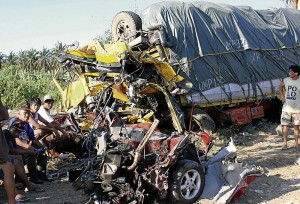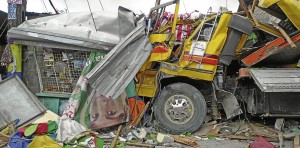Putting a halt to our own ‘Runaways’

THIS ACCIDENT along the Maharlika Highway in Tayabas City, Quezon, left four people dead. DELFIN T. MALLARI JR./INQUIRER SOUTHERN LUZON
Rolling coffins and “Runaways.”
That’s how wayward trucks and buses are called. And just like in the suspense-thriller movie “Runaway” starring Denzel Washington, hapless humans have to deal with the brute force of uncontrolled machines. But while Denzel and co. are the heroes in a Hollywood movie, what happens in real life turns out to be tragically different.
This must have been how the end began for the five people killed in the Tikling junction that fateful January 12: A 10-wheeler dump truck carrying tons of gravel, descending from the hills of Antipolo, suddenly suffers a burst air compressor. The brakes, powered by air, likewise fail. The driver, suddenly overcome by panic, steers toward a row of other motorists, pedestrians and students and their waiting tricycles and motorcycles. The truck, rampaging downhill at more than 80 kph, runs over a young student, two other pedestrians, other cars and a waiting shed, and finally bulldozes a police precinct.
All in all, 13 people are rushed to the hospital for serious injuries, five die on the spot, including the truck driver and his wife who was beside him in the truck. We will never know what happened exactly.
This accident in Tikling has been another sickening installment to a series of accidents involving wayward trucks and buses. It has been happening for decades, and the examples are too many to ignore. One early morning in 1995, a dump truck also lost its brakes and slammed into a shanty where a family of five slept. The entire family died. Ten years ago in Cagayan de Oro, the entire steering box of a truck collapsed. The truck careened out of control.
In 1999, a fuse cargo truck traversing a crowded road in Las Piñas suddenly lost control, and collided with a Mitsubishi L-300 coming from the opposite direction. The truck then hit a microbus, which in turn killed a woman who was on her way to a midnight Mass.
The more tragic news is that these incidents would most likely happen again in the very immediate future.
But not if some automotive experts have their way. Alarmed by the regularity of such accidents, these automotive experts are urging the government to do something concrete, starting with strict random checks on heavy vehicles used for industrial and commercial purposes.
Olson Camacho of Project O, which specializes on industrial vehicle repairs and conversions, is quite specific with who should be doing the checking. “There should be random checks as well as standards to follow for these vehicles. To prevent corruption, the government can deputize reputable NGOs to work with the LTO.”
He added that even trucks and buses being repaired should get approvals and certifications from accredited agencies, such as what is being done in New Zealand and Australia’s Motorsafe.

A 10-WHEELER dump truck descending from the hills of Antipolo ran over a young student, two other pedestrians, other cars and a waiting shed, and wrecked a police precinct. August dela Cruz
On the other hand, auto expert Ferman Lao of Speedlab suggests that authorities should take a closer look at the drivers. He urged “an in-depth look at how a typical truck, bus, large load vehicle operator and driver gets his or her training or certification.”
Lao hopes for a better system of traffic incident investigation. He also questioned whether licenses were issued to “truly qualified drivers” or if renewals of vehicle registrations were awarded to road-worthy vehicles. “Whatever happened to the MVIS [Motor Vehicle Inspection System], to begin with?”
Forensic investigators
Automotive technologist Alex P. Loinaz said that what the government needs are forensic crash investigators who are trained in automotive technologies.
“Are the investigators even aware that they need to examine the air or hydraulic brakes for them to determine if the brake fluid boiled or air brakes failed? My feel (for the Taytay accident) is that the brakes faded. The linings reached the fade point, so no matter how much pressure was applied, the truck just couldn’t stop.”
Lao explained that larger trucks use air brakes.
Air brakes have to maintain a certain supply of compressed air in order for them to function. Lao’s sources said that most of the truck accidents in the Antipolo and Taytay areas have been due to drivers mistakenly riding the brakes down to control the vehicle during the descent.
Loinaz said riding the brakes accelerates the fade of brake pads and linings.
“The coefficient of friction of asbestos brake linings is just too low for the kind of load, hard braking and speed they travel. Race and high-performance cars use new quality fiber materials, metallic or ceramic brake pads.
You can smell the brakes of speeding buses along EDSA and Commonwealth due to the velocity and hard braking these buses and trucks are subjected to,” said Loinaz.
And that tell-tale smell can’t be good.
He said asbestos brakes should have been banned a long time ago, but they are still sold and used for rebonding brake lining material.
Big firms in the know?
Camacho has also urged authorities to look into the policies of construction-related firms such as cement companies and check if they condoned, tolerated or even encouraged their truck drivers to achieve unreasonable quotas, resulting in many of them speeding to their next delivery destinations.
He also asked authorities to check the maintenance history of these firms’ trucks.
He added that even bus companies should be properly monitored, as these have also been involved lately in accidents resulting from mechanical troubles.
“These big firms should hire only trucks and haulers with impeccable maintenance. This deputized agency should make random checks on airbrakes at any given time. They should look at the pressure gauges, and check again if the brake system is rated to handle the load,” said Camacho.
Lao revealed insider and first-hand information on the state of the truck maintenance and conversion in the Philippines:
Reconditioned trucks (which are the haulers of choice in the Philippines for its low cost) are usually converted from right-hand drive to left-hand drive. “Practically all RHD to LHD converted vehicles I’ve ever encountered had issues (electrical and mechanical) related to the conversion.”
“A friend of mine was looking for a truck for transporting building materials, including quarry material, some time ago and was looking for one with a high load capacity.
The standard practice, it seems, is to ’upgrade’ the suspension to increase load capacity, but it is doubtful if the brakes are
upgraded as well.”
Lao said this bad habit of not minding the brakes is hard to break, especially for Filipino drivers.
“Lately for our clients we’ve been able to slowly educate them to the value of good brakes, but in general, most people don’t want to spend for proper brakes,” he observed.
Camacho suggests that the Automobile Association Philippines help certify modifications and repairs being done on trucks and buses.
